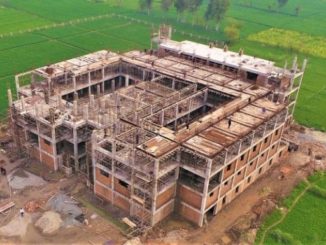
Khawaja Dawood/South Asia Correspondent for The Santiago Times
LAHORE – A mob running into hundreds tore down a historic property belonging to Pakistan’s Ahmadi community this week, exposing the the government’ inability to protect the rights of minorities in the South Asian country.
The attack took place in the most populous Punjab province, with videos showing enraged protesters razing the place of worship.
rahmat-e-sayyad-e-laulak pe kamil iman
ummat-e-sayyad-e-laulak se ḳhauf aata hai
Mob vandalized Ahmadi Mosque Baitul Mubarik and historical Building, house of Mir Hassamuddin, in Sialkot. No police was present to either protect the Community or the place of worship @CMShehbaz pic.twitter.com/ap0jGBVJes— M. Jibran Nasir (@MJibranNasir) May 24, 2018
No worshiper was believed to have been in the mosque at the time of the attack which is condemned by the country’s top opposition party – the Pakistan Tehreek-e-Insaf (PTI).
PTI strongly condemns the targetting of Ahmedis in Sialkot. We demand the Punjab Govt to take severe action against whoever involved in this heinous crime and protect the rights of all religious minorities. #PTI
— PTI (@PTIofficial) May 25, 2018
However, the man who was leading the violent mob was Hafiz Hamid Raza, a leader of the same PTI, who later thanked the local authorities for supporting their actions. He also threatened to burn down th whole city if a case is registered against any member of the mob.
Leading the violent mob was Hafiz Hamid Raza, leader of Pakistan Tehreek-e-Insaf. Who later thanked the local authorities for supporting the vandalism of #Ahmadi worship place. He also threatens to burn down Sialkot if a case is registered against any member of the mob. #Pakistan pic.twitter.com/BfZrQkWXQg
— Naila Inayat (@nailainayat) May 24, 2018
Late on Thursday, dozens of municipal authority men joined the enraged protesters that razed the structures “without any official or court directive”.
A spokesman of Jamaat-e-Ahmadiyya said that “a 500-strong mob had desecrated their worship place Baitul Mubarik and a one-time residence of the Jamaat founder.
The house in old Sialkot city had been an important place of worship for the sect for the past 135 years. It was said to be visited by Mirza Ghulam Ahmad who founded the faith and is considered to be a prophet by its followers.

Saleemuddin, the spokesman, lamented that police played the role of “silent spectator”. He added the bone of contention was the renovation of a house in front of the worship place.
No one, neither area inhabitants or police personnel, tried to stop the mob from razing the structures. “They continued to vandalise the structures till the early hours of Thursday. They returned once again after offering Fajr (morning) prayers,” Saleemuddin said.
On the other hand, officials claimed that the strength of the mob was between 150-200 people, including 15-20 policemen. Reiterating the stance of municipal authorities, the police also termed the house in Mohalla Kashmirian “illegal” and defended the move to seal it.
Ahmadis were declared “non-Muslims” by Pakistan in 1974, depriving them of many basic rights. Sections 298-B and 298-C of the Pakistan Penal Code outlaw Ahmadis from calling their place of worship a mosque, claiming to be Muslims or preaching their faith to others.
Following the attack, the Human Rights Commission of Pakistan (HRCP) has noted that the Ahmadiyya community was “in the middle of a legal process to acquire access to the building” when the local administration began the demolition process “without having acquired permission from the court”.
The mayor of Sialkot, Chaudhry Tauheed Akhtar, however maintains that the building that was demolished was “an illegal construction” and scheduled for demolition.
The latest attack on the community comes amid reports in local media that Ahmadis had been turning a building, next to Baitul Mubarik, into a ‘museum’ in the memory of their Jamaat founder.

The house in Mir Hassamud Din Street is located close to Iqbal Manzil – the birthplace of Pakistan’s national poet Allama Muhammad Iqbal – and is being reconstructed with Diyar wood and small Sialkoti bricks in order to restore it to its former glory.
Some two weeks ago, the imam (or preacher) of a local Muslim mosque, had warned the city’s top civil officer of strong protests if the redecoration of the house continued.

There was no damage to the ‘musuem’ reported in the Thursday night’s attack.
The regional president of the Jamaat, Mumtaz Butt has insisted the work involved “a bit of renovation” only.
The latest act of aggression comes weeks after a religio-political party – Tehrik Labbaik Ya Rasool Allah (TLYR) – had warned of strong agitation if Ahmadis express themselves freely or engage openly in religious activities.
According to eyewitnesses, many of the protesters were chanting slogans in favor of the party which has gained notoriety as the champion of the finality of Islamic Prophet Mohammad.
Pir Ijaz Ashrafi, a central leader and spokesman for the TLYR, in a conversation with The Santiago Times, thanked the protesters (mob) for such “a timely action”.
He also vowed to launch a stronger action against the persecuted community in future.
Pakistan avoids Islamists showdown over anti-blasphemy row with ruling party
Ashrafi belongs to the same party of Sunni fundamentalists who had sealed one of the country’s metropolis – Lahore – after the government failed to address their woes over the issue of blasphemy last month.
The party backs strict blasphemy laws in one of the world’s most dangerous countries for religious minorities. Christians, Hindus, Sikhs, Buddhists and others make up around 3 percent of Pakistan – the sixth most populous state in the world.
It has the second largest number of Muslims in the world after Indonesia.
Pakistan has in the past detained dozens of Ahmadis under the country’s religious laws, with three members of the community sentenced to death last year for alleged blasphemy.



